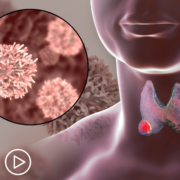Personalized Treatment Approaches in Advanced Thyroid Cancer Management
Personalized Treatment Approaches in Advanced Thyroid Cancer Management from Patient Empowerment Network on Vimeo.
How can advanced thyroid cancer be managed in a personalized way? Expert Dr. Megan Haymart from the University of Michigan discusses personalized treatment approaches and patient advice for optimal care, shared decision-making, and support programs.
[ACT]IVATION TIP
“…if your disease has progressed and you’ve seen an endocrinologist and maybe they don’t routinely give these targeted treatments, make sure you’re referred to an appropriate person who does. Two, I would encourage individuals to make sure that they had tumor sequencing, which means they can look at the tumor and see what is the mutation.”
See More from [ACT]IVATED Thyroid Cancer
Related Resources:

|

|

Advancing Thyroid Cancer Care: Tailored Treatment and Patient Involvement |
Transcript:
Lisa Hatfield:
Dr. Haymart, can you discuss the role of personalized medicine in managing advanced thyroid cancer, particularly tailoring treatments based on individual patient characteristics?
Dr. Megan Haymart:
So advanced thyroid cancer, when I think of those words I’m specifically talking about patients who have distant metastasis that is progressing. So it’s not just that they have a small site of sort of cancer recurrence that’s sort of stable. This is disease that’s progressing. And the things that have really changed in the past five to 10 years is we have more targeted treatments for these individuals.
There have been more clinical trials that have been completed, and these trials have shown which patients might be appropriate candidates for these treatments. And so my activation tip for this question is if you have advanced thyroid cancer, if you have disease that’s progressing, it’s not treated with standard therapy.
One, make sure you see physicians who are capable of treating this disease. So even though I see 95 percent of all thyroid cancer patients, I’m an endocrinologist and I actually, I’m not the one who gives these targeted treatments to the 5 percent or less who have advanced disease, I would refer them to my medical oncology colleague. And so, if your disease has progressed and you’ve seen an endocrinologist and maybe they don’t routinely give these targeted treatments, make sure you’re referred to an appropriate person who does.
Two, I would encourage individuals to make sure that they had tumor sequencing, which means they can look at the tumor and see what is the mutation. And it’s possible that there’s either an already available drug or a clinical trial that’s targeted towards their specific tumor mutation.
Lisa Hatfield:
Dr. Haymart, how can patients engage in shared decision-making with their healthcare providers to determine the most appropriate treatment approach for their thyroid cancer? And what role do patient navigators or support programs play in improving outcomes for disadvantaged patients navigating the complexities of thyroid cancer treatments?
Dr. Megan Haymart:
So a key thing here for thyroid cancer for 95 percent of patients is you have time on your side. So patients shouldn’t feel rushed to make a decision. So you have your clinic visit, you don’t need to make a decision on your treatment by the end of the visit. You can gather more information, so you can read more using reliable resources that your physician recommends. You can talk to your friends and family members. You can tell your healthcare provider, “You know, I appreciate the information that you gave me. I need more time to process this. I’ll be in touch with you.”
So patients don’t need to feel rushed during that decision-making process. It’s important that they know that for most of the time, for thyroid cancer, it’s preference sensitive decisions, meaning shared decision-making is totally appropriate. There’s no right or wrong answer in many of these scenarios.
And so the patients can really tailor it to them and what their priorities are. There’s been less data on patient navigators in the realm of thyroid cancer, but for other cancers, it’s been shown to be very useful and helpful, and patients have had positive responses to working with patient navigators. But if they aren’t available at your institution, don’t feel bad about bringing in a family member or a friend as an extra set of ears, and as someone that you can talk things over with later.











